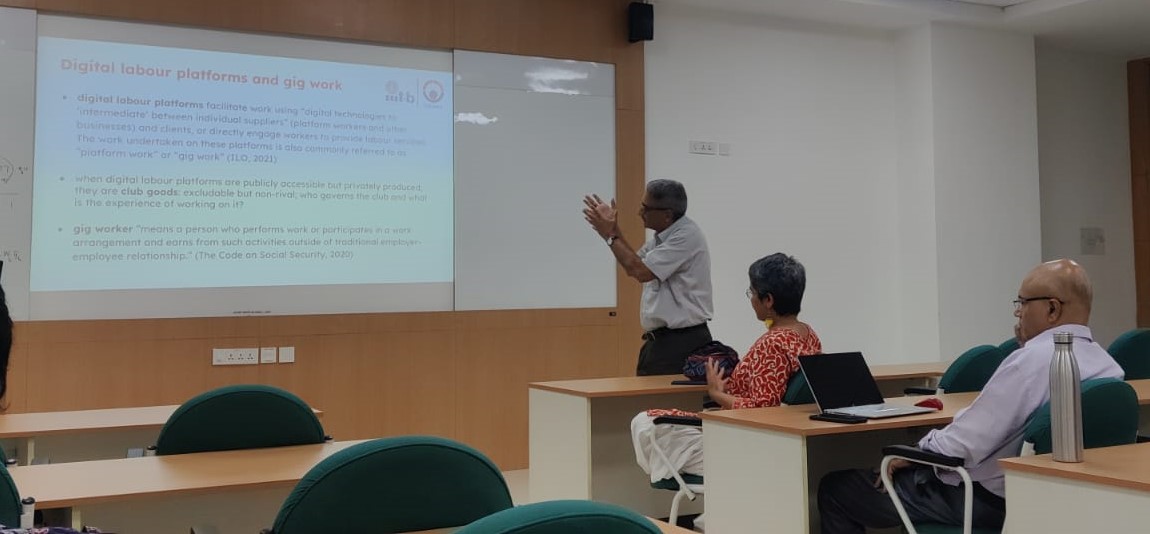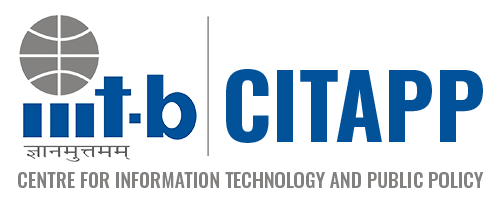
Date: 20/09/2023
About the Talk:
Digital Public Infrastructures (DPIs) are the rage as they promise to technological means to address many social challenges, in particular to expand the reach and the speed of public service delivery. Amidst the hopes, a variant of DPIs, Digital Private Goods – publicly accessible, but privately produced digital platforms – are being promoted to address the employment challenge by the expanding opportunities for gig work. These platforms are club goods, characterized by excludability and non-rivalness, raising questions about who governs the club and how work in the club is experienced. This presentation will explain the promise of gig work as a flexible livelihood option, and why workers are also drawn to it. But what the presentation will show is that workers experience flexibility as precarity.
While precarity is manifest in the lives of a large proportion of Indian workers, this presentation will explore the nature of gig work in the digital platform economy by drawing on research on geographically tethered platforms by the Fairwork India project. The project examines labour conditions in the platform economy along the five principles of Fair Pay, Fair Conditions, Fair Contracts, Fair Management, and Fair Representation. The presentation will draw on interviews with nearly 1000 workers, working on platforms offering services in domains including ride-hailing, food delivery, and home services, conducted between 2019 and 2023, in Bangalore, Delhi, and Kochi.
The presentation will examine three manifestations of precarity in the platform economy – precarity in income, precarity experienced through subcontracting, and precarity from regulation. Precarity in income reflects the unpredictability in worker earnings on platforms. Most workers are unable to make a minimum wage in part because their earnings rely significantly on incentive schemes which vary widely by location and time. Secondly, precarity is experienced as a result of subcontracting. Although not unique to platform work, the practice of subcontracting amplifies the precarity of gig workers by increasing the distance between the worker and the platform. This, in turn, has implications for the efficacy of grievance redressal, workers’ access to safety nets such as insurance, and their other working conditions.
Lastly, the presentation delves into the precarity that gig workers experience in an ambiguous regulatory landscape. It is unclear whether platforms are technology companies, or are governed by the laws of the domain they operate in. Similarly, with the law silent on the status of gig workers, they are treated as ‘independent contractors’ with neither job security nor welfare benefits. In discussing these forms of precarity, the presentation will emphasise the role played by technology in amplifying these conditions through their use of opaque algorithms and data, and in offering new opportunities for workers to subvert this ecosystem and undercut their precarity in small but significant ways.
Speaker Bio:
Balaji Parthasarathy joined IIITB in July 2000 as an Assistant Professor, and became a Professor in February 2013. He served as the Institute’s first Dean (Faculty) from January 2014 until February 2017. In 2012, he also co-founded IIITB’s Center for Information Technology and Public Policy. His intellectual interests are rooted in economic geography and economic sociology, and explore the relationships between technological change and innovation, economic globalization, and social transformation. Within this broad focus, his work follows two threads. One thread examines the impacts of public policies and firm strategies on the social and spatial organization of production in the ICT (information and communications technology) industry. Another thread deals with ICTs for Development or ICTD. Here, his interests lie in understanding how ICTs are deployed in various domains of activity to transform social relationships, especially in underprivileged contexts.
The talk was followed by a discussion and Q&A
CITAPP’s Monthly Seminar Series is an attempt to create a forum where researchers across IIITB domains can meet and discuss cutting-edge research on the chosen theme of the semester. The Series hopes to explore a technology or topic for its ramifications in different realms of social activity. In particular, we are interested in understanding the specific kinds of complexity that these domains present for technological innovation and design.

